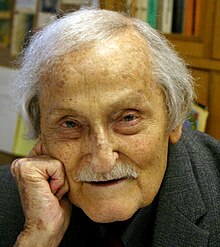Phillip Tobias
| Phillip Vallentine Tobias | |
|---|---|

Phillip Vallentine Tobias
|
|
| Born |
14 October 1925 Durban, Natal, South Africa |
| Died | 7 June 2012 (aged 86) Johannesburg, South Africa |
| Nationality | South African |
| Fields | Anthropology |
| Alma mater | University of Witwatersrand |
| Thesis | Chromosomes, Sex Cells, and Evolution in the Gerbil (1953) |
| Known for | Paleoanthropological and evolutionary work |
| Notable awards | Fellow of the Royal Society |
Phillip Vallentine Tobias FRS (14 October 1925 – 7 June 2012) was a South African palaeoanthropologist and Professor Emeritus at the University of the Witwatersrand in Johannesburg. He was best known for his work at South Africa's hominid fossil sites. He was also an activist for the eradication of apartheid and gave numerous anti-apartheid speeches at protest rallies and also to academic audiences.
Born in Durban, Natal on 14 October 1925, the only son and second child of Joseph Newman Tobias and his wife, Fanny (née Rosendorff), Phillip received his first schooling in Bloemfontein at St Andrew's School and in Durban at the Durban High School. In 1945, he started his career as demonstrator in histology and instructor in physiology at the University of Witwatersrand. He received his Bachelor of Science (Hons) in Histology and Physiology in 1946–1947. In 1948 he was elected the first President of the National Union of South African Students. He graduated in Medicine, Bachelor of Medicine, Bachelor of Surgery in 1950. He was appointed as a lecturer in anatomy in 1951. In 1953, he received his Doctor of Philosophy for a thesis entitled Chromosomes, Sex-Cells, and Evolution in the Gerbil.
In 1955, Tobias started his post-graduate research at the University of Cambridge, England, where he filled the position of Nuffield Dominion Senior Traveling Fellow in physical anthropology. The following year, at the University of Michigan at Ann Arbor and the University of Chicago, he was the Rockefeller Traveling Fellow in anthropology, human genetics, and dental anatomy and growth. In 1959, he became Professor and Head of the Department of Anatomy and Human Biology, succeeding his mentor and eminent scholar, Professor Raymond Dart. In 1967, he was awarded a Doctor of Science in palaeoanthropology for his work on hominid evolution. During this period he attended the University of the Witwatersrand. He was Dean of Medicine from 1980 to 1982. He was appointed Honorary Professor of Palaeoanthropology at the Bernard Price Institute for Palaeontological Research in 1977 and Honorary Professor in Zoology in 1981. Also in 1981, Tobias became a founding member of the World Cultural Council.
...
Wikipedia
